Venue: Manhattan Wardrobe Supply
Makeup: Mehron Cosmetics
Videographer: Ailina Dohn
In celebration of Pride Month, XOXO sat down with drag king Andro Gin and chatted while they did their makeup. Andro, a non-binary drag king and artist, talked about their tips on getting into drag and how the community has changed. Read or watch the interview below.
Q: How did you get into makeup?
Andro: My whole life, I had always dressed up. I was always cross-dressing in some type of way, I was always cosplaying, I was always doing art. I was always doing theater, but I never really tied everything together. I didn’t realize you could until drag. The reason why I do this is because genuinely I could not figure out how to do beige. I don’t know the nuances between brown and beige and nude. Now you see a lot of people doing this, but back when I started, nobody was. I was like, “You know what I can figure out? Reds, yellows…” I can blend cayenne, yellow and magenta. I can figure that out. So then I kind of just flew by the seat of my pants because I didn’t really have a good example. There was maybe one or two artists that I took inspiration from like Mystery Meat, but no one was really doing this so I kind of just did what I felt was cool. I always recommend that. When everybody asks, “Oh, what’s the secret?” I’m like, “Just do what you find is cool and then that’ll catch on.” I don’t know about you, but I want to be remembered and you don’t get remembered by being like everybody else. Just do what you think is fun. If you think a smoky eye is fun, do it and the audience will feel that and your followers will feel that. If you’re doing something because you know it’s going to get there quick like, people sense that. When it comes to makeup, I had no experience. I didn’t tell anybody that I didn’t. Everybody was like, “Oh my God, look at this!” and I’m like, “Really? Because I messed up like five times.” A lot of the things that I created as trends back in the day ending up starting off is my mess-ups. I had this brow look where it was multiple lines in the brow. Everyone’s like, “I love this. What’s the vision?” and I’m like, “They were uneven.” People don’t understand that if you don’t tell somebody, their imagination is going to imagine that you did it on purpose. So I go out. Even if you look like garbage, if you walk out and be like, “I look amazing!” people will buy, it’s a fantasy.
Q: How did you get into drag?
Andro: I went on to drag for the first time because there was a party in Miami called “Counter Corner” It was a weird party, so I dressed up and everyone was like, “Oh my God, are you from Chicago? How long have you been doing this?” I’m like, “This is my first time out in drag,” and they’re like, “You’re booked next month. This is your first time? That’s crazy. You’re booked.” I was like, “That’s great. Sure!” It just took off from there. Chicago is such a notorious place for good drag. It really cooks good drag artists that have a fully realized character, aren’t afraid to step outside of the box, aren’t afraid to do something different. They kind of set the standard for a lot of cities. I went out just wanting to feel my oats. Everyone thought it was a boy and they were like, “Who’s this twink?” which was great and affirming and they were like, “you know, “Oh, you’re drag! How long have you been doing it? Where are you from?” and I’m like, “This is my first time I don’t even have drag name yet!” They’re like, “Okay, so welcome to the club, your booked next month and the month after that.” I was just kind of roped into performing, but that’s always where you want to be. It’s not that you can’t fight to be in your spaces, but you always want to go where you’re seen.
Q: How has the drag community changed over time?
Andro: Drag race has changed a lot. I’m not going to dog on it altogether because some of its good. It’s heightened everyone’s standard, it’s inspired a lot of babies. My spiritual drag parents were Vander Von Odd and Sasha Velour at the same time. So Vander Von Odd winning Dragula season one and then seeing Sasha Velour’s “Rose Petal” was one of those moments where I was like, “I can get hit a one, two, but I’m not going to be doing those things.” When I saw the way that she was able to move a crowd and move me just by the sheer power of theatrics and being connected to the song, I was like “I want to make people feel what that just made me feel” and that just changed my life in a way I didn’t realize I needed. Drag race has inspired a lot of artists, but what has changed is a lot of the times people are in for that quick viral video. Oftentimes, unfortunately that is what gets you noticed, the amount of copycats I had when I first started because I was doing something fresh and new and people didn’t have a creative bone in their body to come up with it on their own. There’s a lot of people desperate for attention, so they’ll copy from other artists not give the credit. I have learned to be more flattered by it. It used to affect me on a level that I felt like my art was being assaulted. It felt like I had no say because it was out of my control.
Q: How has the makeup community changed over time?
Andro: I think makeup now is definitely just everybody piggybacking off each other. You’ve got Laurel Charlstons and you’ve got those people out there that are definitely doing what I do. I have inspirations here and reference photos. Reference photos. I’ll look to graffiti, I’ll look at toys, I’ll look at puppets, I look at the way porcelain dolls are made, I look at illustration, I look at manga. You want to find inspiration where the masses aren’t already are. I’m eager to see where makeup goes because now that people are kind of getting bored of the feathered brow, the clean girl look, people are now starting to explore a little bit more again, kind of like in 2016, there was that little bit of an exploration and then it got stripped back and then of course things are cyclical. People now are starting to be like, “Why aren’t we just going outside looking fun every day? Why aren’t we just doing this all the time?
Q: What does it mean for you to represent the non-binary community in drag?
Andro: The trans experience is not a monolith. One trans woman’s experience is not going to be another trans woman’s experience and it’s even more so for the non-binary experience. Oftentimes, marginalized communities have the burden of being face of. Drag is more trans and I think people realize. The dressing room is more often filled with trans people than it is with cis people especially nowadays with Gen Z and millennials kind of taking up that space. The dressing rooms are mostly non-binary nowadays. When it comes to being non binary in drag, I think the most radical existence is just existing. I’m not here to explain my existence to people who don’t want to get it. If you get it, you get it. The people in the drag community really respect me. These are girls that are pageant to spooky. I have that respect and they’ll book me in these kind of Fort Lauderdale places where the audiences just don’t get me. It’s a very cisgender place where they’re like, “A drag king, I’ve never heard of that before. “and I’m like, “Oh my God. Have you talked to a lesbian? Do you know, a lesbian?”
Q: Is there a message you want to give to our LGBTQ+ audience?
Andro: As a professional, when I was doing [drag] full time, what I would do was if inspiration came to me, I always had a notebook. I always had something with me because I can’t always guarantee that when a job calls, I’m going to be in the mood to want to create something. I would always have a notebook, I would always draw out a face and be like, “This is a face chart for the next time.” Forcing creativity is just the worst. It makes you feel like, “Why am I here?” You’ve got to really take care of yourself in that kind of a thing.
Q: What other hobbies/passions do you have?
Andro: With dancing, working five days a week is probably super, super fulfilling and enriching for them. If that’s really your passion, be on that stage every day. But for me, I’m doing Broadway numbers. No one wants to see “Poor Unfortunate Souls” seven days a week. My drag character was based off the queer coded villain. So I very much wanted to be like Alucard from Castlevania, like a Dracula, like a Rasputin. I wanted to be that sexy, very obviously gay villain. I should have known I was queer when I was saw Hunchback, and I was like, “That jester is something else.” My mom was like, “You’re not into the hunky blonde guy?” I want the gay jester. Of course, I didn’t have that vocabulary at the time, so I was like, “The fun one.” My background before anything has always been theater, so character work, storytelling, I’m also a playwright. That kind of stuff is super important to me. All my numbers kind of have a place he was before and a place he is going after. Sometimes with my performance mugs, it needs to make sense for the stage. It’s not always going to be hyper detailed and with a lot of tidbits and things like that, because the person in the back doesn’t see that. For this kind of artistry stuff, I always try to have, “What is he feeling? What is this character feeling? What is he going through?” He’s always a vehicle for the nasty emotions that I feel that aren’t really kosher to say out loud like, jealousy, revenge, wanting to see someone hurt, nasty emotions that we all feel. I kind of challenge and channel into him. I definitely need structure because my ADD knows no bounds.
XOXO,
Your Fashion Bestie
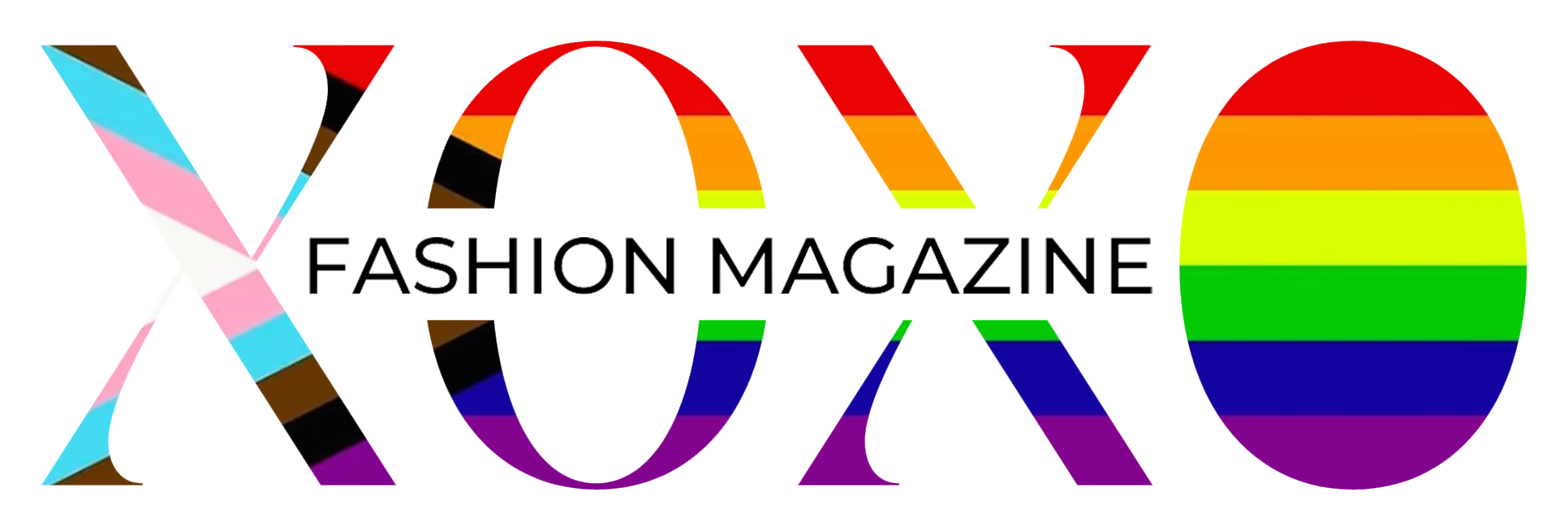
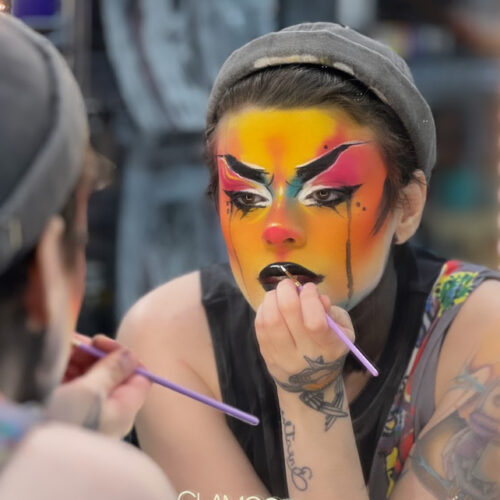
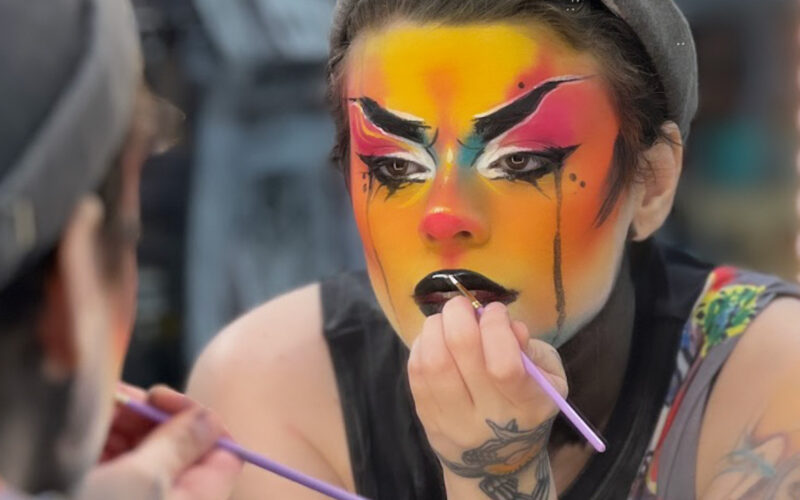

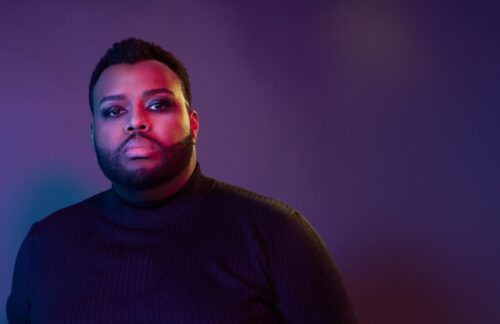
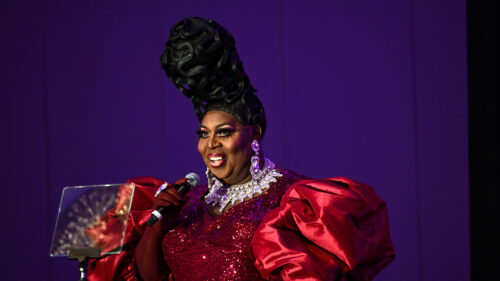
1 Comment
Hi